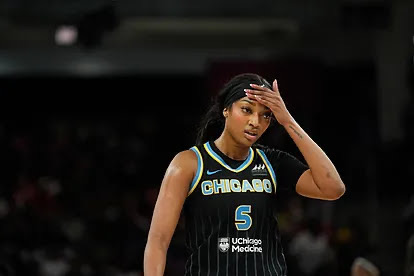Angel Reese, the star forward for LSU’s women’s basketball team, has sparked a heated debate about fairness and double standards in officiating within college basketball. In a candid post-game interview, Reese criticized what she sees as biased refereeing, arguing that officials are giving Caitlin Clark, the Iowa Hawkeyes’ standout guard, preferential treatment on the court. Reese’s comments have reignited discussions about race, media bias, and how different players are perceived and treated within the sport.
Reese vs. Clark: A Tale of Two Stars
Reese and Clark are two of the most talked-about players in women’s college basketball, each bringing a distinct style, swagger, and undeniable talent to the game. However, Reese claims that the referees seem to favor Clark, particularly when it comes to fouls and officiating leniency. While Clark has been celebrated for her aggressive style of play, Reese argues that the same level of physicality would lead to quick fouls and scrutiny if displayed by her or other Black athletes.
During a recent game, Reese pointed to several calls that she felt were blatantly biased. “It’s like they’re playing two different games,” Reese said. “When Caitlin does it, she’s praised for her passion and competitiveness. When I do it, I’m called ‘unsportsmanlike.’ The referees are just feeding into that narrative.”
The Refereeing Controversy: Is There a Double Standard?
Reese’s frustrations echo a larger sentiment felt by many athletes and fans who believe that the officiating in women’s basketball is inconsistent at best and racially biased at worst. Observers note that Clark often gets away with plays that would almost certainly be whistled against Reese, such as pushing off defenders, using aggressive hand checks, and getting heated with referees without consequence.
Critics argue that referees often seem hesitant to call fouls on star players like Clark, whose marketability and status as a “face of the sport” may influence their decisions. In contrast, players like Reese, who play with an equally fiery demeanor, are often subjected to more stringent scrutiny and are quickly penalized for the same actions.
Race, Media, and Perception in Women’s Sports
The tension between Reese and Clark isn’t just about basketball; it’s a microcosm of broader societal issues. Clark, often dubbed “America’s Sweetheart” by the media, is celebrated for her on-court antics and aggressive style. In contrast, Reese, a Black woman from Baltimore, is frequently labeled “controversial” or “disrespectful” for displaying similar behavior.
Reese’s claims of differential treatment echo past criticisms from Black athletes who have pointed out how race influences media narratives and public perception. When Clark trash-talks, she’s seen as competitive; when Reese does it, she’s seen as problematic. This dynamic has led many to question whether underlying biases are at play, influencing how referees call games and how the media portrays players.
The Fallout and What’s Next
Reese’s comments have divided the basketball community. Some fans and analysts support her stance, arguing that she’s shedding light on an issue that has long been ignored. Others see her complaints as baseless and indicative of sour grapes, claiming that Clark’s stardom is based purely on her skill and not any favoritism from referees.
As Reese and Clark continue to dominate headlines, the conversation around officiating standards, race, and media portrayal in women’s sports is far from over. Whether or not Reese’s claims will lead to any changes in how referees call games remains to be seen, but one thing is clear: the spotlight is now on the officiating crew just as much as it is on the players themselves.
Angel Reese’s outcry serves as a stark reminder that sports are never just about the game—they’re a reflection of the complex societal dynamics that shape our perceptions, biases, and ultimately, our judgments.
